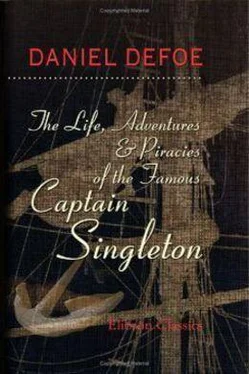The Portuguese, we could see, were in the utmost confusion; and not being aware of our design, their ship having fresh way, ran their bowsprit into the fore part of our main shrouds, as that they could not easily get clear of us, and so we lay locked after that manner. The enemy could not bring above five or six guns, besides their small–arms, to bear upon us, while we played our whole broadside upon him.
In the middle of the heat of this fight, as I was very busy upon the quarter–deck, the captain calls to me, for he never stirred from us, "What the devil is friend William a–doing yonder?" says the captain; "has he any business upon, deck?" I stepped forward, and there was friend William, with two or three stout fellows, lashing the ship's bowsprit fast to our mainmast, for fear they should get away from us; and every now and then he pulled a bottle out of his pocket, and gave the men a dram to encourage them. The shot flew about his ears as thick as may be supposed in such an action, where the Portuguese, to give them their due, fought very briskly, believing at first they were sure of their game, and trusting to their superiority; but there was William, as composed, and in as perfect tranquillity as to danger, as if he had been over a bowl of punch, only very busy securing the matter, that a ship of forty–six guns should not run away from a ship of eight–and–twenty.
This work was too hot to hold long; our men behaved bravely: our gunner, a gallant man, shouted below, pouring in his shot at such a rate, that the Portuguese began to slacken their fire; we had dismounted several of their guns by firing in at their forecastle, and raking them, as I said, fore and aft. Presently comes William up to me. "Friend," says he, very calmly, "what dost thou mean? Why dost thou not visit thy neighbour in the ship, the door being open for thee?" I understood him immediately, for our guns had so torn their hull, that we had beat two port–holes into one, and the bulk–head of their steerage was split to pieces, so that they could not retire to their close quarters; so I gave the word immediately to board them. Our second lieutenant, with about thirty men, entered in an instant over the forecastle, followed by some more with the boatswain, and cutting in pieces about twenty–five men that they found upon the deck, and then throwing some grenadoes into the steerage, they entered there also; upon which the Portuguese cried quarter presently, and we mastered the ship, contrary indeed to our own expectation; for we would have compounded with them if they would have sheered off: but laying them athwart the hawse at first, and following our fire furiously, without giving them any time to get clear of us and work their ship; by this means, though they had six–and–forty guns, they were not able to fight above five or six, as I said above, for we beat them immediately from their guns in the forecastle, and killed them abundance of men between decks, so that when we entered they had hardly found men enough to fight us hand to hand upon their deck.
The surprise of joy to hear the Portuguese cry quarter, and see their ancient struck, was so great to our captain, who, as I have said, was reduced very weak with a high fever, that it gave him new life. Nature conquered the distemper, and the fever abated that very night; so that in two or three days he was sensibly better, his strength began to come, and he was able to give his orders effectually in everything that was material, and in about ten days was entirely well and about the ship.
In the meantime I took possession of the Portuguese man–of–war; and Captain Wilmot made me, or rather I made myself, captain of her for the present. About thirty of their seamen took service with us, some of which were French, some Genoese; and we set the rest on shore the next day on a little island on the coast of Brazil, except some wounded men, who were not in a condition to be removed, and whom we were bound to keep on board; but we had an occasion afterwards to dispose of them at the Cape, where, at their own request, we set them on shore.
Captain Wilmot, as soon as the ship was taken, and the prisoners stowed, was for standing in for the river Janeiro again, not doubting but we should meet with the other man–of–war, who, not having been able to find us, and having lost the company of her comrade, would certainly be returned, and might be surprised by the ship we had taken, if we carried Portuguese colours; and our men were all for it.
But our friend William gave us better counsel, for he came to me, "Friend," says he, "I understand the captain is for sailing back to the Rio Janeiro, in hopes to meet with the other ship that was in chase of thee yesterday. Is it true, dost thou intend it?" "Why, yes," says I, "William, pray why not?" "Nay," says he, "thou mayest do so if thou wilt." "Well, I know that too, William," said I, "but the captain is a man will be ruled by reason; what have you to say to it?" "Why," says William gravely, "I only ask what is thy business, and the business of all the people thou hast with thee? Is it not to get money?" "Yes, William, it is so, in our honest way." "And wouldest thou," says he, "rather have money without fighting, or fighting without money? I mean which wouldest thou have by choice, suppose it to be left to thee?" "O William," says I, "the first of the two, to be sure." "Why, then," says he, "what great gain hast thou made of the prize thou hast taken now, though it has cost the lives of thirteen of thy men, besides some hurt? It is true thou hast got the ship and some prisoners; but thou wouldest have had twice the booty in a merchant–ship, with not one quarter of the fighting; and how dost thou know either what force or what number of men may be in the other ship, and what loss thou mayest suffer, and what gain it shall be to thee if thou take her? I think, indeed, thou mayest much better let her alone."
"Why, William, it is true," said I, "and I'll go tell the captain what your opinion is, and bring you word what he says." Accordingly in I went to the captain and told him William's reasons; and the captain was of his mind, that our business was indeed fighting when we could not help it, but that our main affair was money, and that with as few blows as we could. So that adventure was laid aside, and we stood along shore again south for the river De la Plata, expecting some purchase thereabouts; especially we had our eyes upon some of the Spanish ships from Buenos Ayres, which are generally very rich in silver, and one such prize would have done our business. We plied about here, in the latitude of ― south, for near a month, and nothing offered; and here we began to consult what we should do next, for we had come to no resolution yet. Indeed, my design was always for the Cape de Bona Speranza, and so to the East Indies. I had heard some flaming stories of Captain Avery, and the fine things he had done in the Indies, which were doubled and doubled, even ten thousand fold; and from taking a great prize in the Bay of Bengal, where he took a lady, said to be the Great Mogul's daughter, with a great quantity of jewels about her, we had a story told us, that he took a Mogul ship, so the foolish sailors called it, laden with diamonds.
I would fain have had friend William's advice whither we should go, but he always put it off with some quaking quibble or other. In short, he did not care for directing us neither; whether he made a piece of conscience of it, or whether he did not care to venture having it come against him afterwards or no, this I know not; but we concluded at last without him.
We were, however, pretty long in resolving, and hankered about the Rio de la Plata a long time. At last we spied a sail to windward, and it was such a sail as I believe had not been seen in that part of the world a great while. It wanted not that we should give it chase, for it stood directly towards us, as well as they that steered could make it; and even that was more accident of weather than anything else, for if the wind had chopped about anywhere they must have gone with it. I leave any man that is a sailor, or understands anything of a ship, to judge what a figure this ship made when we first saw her, and what we could imagine was the matter with her. Her maintop–mast was come by the board about six foot above the cap, and fell forward, the head of the topgallant–mast hanging in the fore–shrouds by the stay; at the same time the parrel of the mizzen–topsail–yard by some accident giving way, the mizzen–topsail–braces (the standing part of which being fast to the main–topsail shrouds) brought the mizzen–topsail, yard and all, down with it, which spread over part of the quarter–deck like an awning; the fore–topsail was hoisted up two–thirds of the mast, but the sheets were flown; the fore–yard was lowered down upon the forecastle, the sail loose, and part of it hanging overboard. In this manner she came down upon us with the wind quartering. In a word, the figure the whole ship made was the most confounding to men that understood the sea that ever was seen. She had no boat, neither had she any colours out.
Читать дальше












